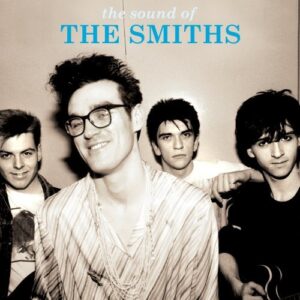
Who Wrote The Smiths’ Songs?
Who wrote The Smiths’ songs? All of The Smiths’ music was written by both Morrissey and Johnny Marr. Morrissey would come up with the vocal melodies and feel of the song, while Marr would arrange all of the guitar parts and the strings. Mike Joyce and Andy Rourke all contributed but to a lesser extent.
Let’s look at everything we know about The Smiths’ recording process.
The general Songwriting process

The Smiths’ music was, and still is, incredibly unique. From Morrissey’s irregular vocal melodies to Johnny Marr’s arpeggiated guitar playing, and even Andy Rourke’s funk-infused bass playing, the combination of the band contributes uniquely to the songs.
Marr’s guitar playing can be termed “Jangle pop,” with shimmering, thick textured guitars laden with reverb, while still playing each chord with enough individuality to drive the songs along. Morrissey’s poetic lyrics break conventional structures, meandering between each phrase while also emitting emotion. He often drew inspiration from classical poets like Oscar Wilde, T.S. Eliot, and Sylvia Plath.
Andy Rourke and drummer Mike Joyce provide the band with a strong rhythmic backbone. Rourke’s melodic bass lines and Joyce’s crisp and dynamic drumming lay the foundation for the band’s infectious grooves. One thing to note is the band’s disdain for the synth-pop. Both Marr and Morrissey viewing the synth as an impersonal instrument that lacked feeling.
However, did the process change from album to album?
The Process behind "The Smiths" (1984)
The Smiths’ first album, their self-titled debut, was released in 1984. This album revealed a natural approach to their music, allowing it to be an organic result of Marr and Morrissey’s collaboration. “We don’t really sit down and say, ‘Right, let’s write a song about this.’ It just happens,” explained Johnny Marr in a 1984 interview with NME.
This approach established their signature indie rock sound, providing each songwriter with opportunities to shine. Marr discovered his iconic jangle pop tone, which he beautifully married to Morrissey’s melancholic and meandering vocals. “I write the words and then Johnny writes the music. It’s a very simple process,” stated Morrissey in a 1984 interview with Melody Maker.
Tracks like “What Difference Does It Make?” and “This Charming Man” became enormous successes, epitomizing the band’s distinctive tone. The Smiths’ debut album not only introduced their groundbreaking musical stylings to the world but also laid the foundation for their subsequent success. This would significantly influencing the alternative music landscape.
The album reached number 2 on the UK albums chart and achieved gold certification.
The Process behind "Meat Is Murder" (1985)
Released in 1985, “Meat is Murder” was The Smiths’ second studio album. It went a way in solidifying their influential musical identity. Unlike their debut album, “Meat is Murder” showcased a more mature and socially conscious approach to songwriting. Morrissey’s poeticism now extended to create thought-provoking lyrics, addressing important cultural topics such as animal rights, environmental issues, and political concerns.
“We wanted to make a statement with this album.” – Johnny Marr (from an interview with Q Magazine, 1985)
Johnny Marr continued to demonstrate his guitar virtuosity on this album, although he now incorporated a wider range of musical styles and textures, showcasing his versatility as a musician.
Continuing the approach of infectious grooves, Marr’s quick right-hand playing is continuously working in partnership with Rourke’s funky and melodic bass riffs. Think of the song “Well I Wonder”, both the guitar and the bass combine to drill home the infectious main riff.
The stand-out track of this album and the one that shows the band’s true versatility is “How Soon Is Now?”. Originally a b-side to “William It Was Really Nothing”, it highlights both Marr’s guitar playing in a way that shows rock-ready influences and disco. A haunting atmosphere is created and driven home thanks to Marr’s use of effects.
The Process Behind "The Queen is Dead"
(1986)
We are at the Holy Grail of The Smiths with the album “The Queen Is Dead”. This album is widely considered the band’s best, and also one of the (if not the) best indie albums of all time. From start to finish it is one of the most cohesive and well-thought-out collection of tracks to exist. It perfectly shows the brilliance of both Morrissey and Marr.
There were an abundance of influences that feed into this album, all of which the band seem to brilliantly blend to create the theme of the album. This ranges from Detroit’s garage scene, music hall, and of course the pop music of the time. The album focuses more on the atmosphere of the music with tracks like “I Know it’s Over” continually developing and showcasing the virtuosity of both songwriters, while also showing the proficiency of Rourke and Joyce.
The album’s lyrics continued to explore themes of societal critique and personal turmoil, with tracks like “I Know It’s Over” and “Never Had No One Ever” delving into Morrissey’s characteristic melancholic introspection. But it also includes some tracks that display a comedic side to the band with, “Frankly, Mr Shankly” and “Cemetery Gates”.
The band even knew how important this album was with them saying “The songs are more complex and the lyrics are more challenging.” – Morrissey (from an interview with The New York Times, 1986). “The Queen is Dead” is a masterpiece and holds a place in the history of alternative rock.
The iconic album enjoyed significant charting success upon its 1986 release. Debuting at No. 2 on the UK Albums Chart, it was a commercial triumph, solidifying the band’s popularity. Read the band do a deep dive on all songs off of this album.
The Process Behind "Strangeways here we come"
(1987)
“Strangeways, Here We Come,” released in 1987, was The Smiths’ final studio album. This album is very much a continuation of the success of “The Queen is Dead”, extending the success of Morrissey’s melancholic lyrics and Marr’s playing. Tensions in the band had arisen by this point due to songwriting credits, where Marr and Morrissey received an 80% split, while Rourke and Joyce split 20%.
The main differences of this album are mainly within the production, where everything is a lot more refined. This includes clearer vocal melodies, and more articulate guitar playing, which is a testament to the band’s progression.
The continuation of Morrissey’s usual themes are highlighted within the tracks “Stop Me If You Think You’ve Heard This One Before” and “Last Night I Dreamt That Somebody Loved Me” with both tracks exploring themes of heartache, longing, and vulnerability.
As a testament to the band, they managed to create a set of tracks that were quintessentially The Smiths, despite being their last album. “Strangeways, Here We Come” still managed to capture the essence of The Smiths’ unique sound, even as it hinted at the band’s imminent end. “This is a very dark album.” – Morrissey (from an interview with The Independent, 1987).
This album is bittersweet, it is dark, and brooding, while also being The Smiths at their best. The fact it was their last album hurts, and it is evident this would have been the case no matter what.
The impact of their music
The Smiths, despite their four-year tenure, are considered one of the most influential indie bands of all time. Thanks to their distinctive blend of jangly guitars, introspective lyrics, and Morrissey’s unique vocal delivery they are solely responsible for establishing a lot of indie and alternative rocks genre conventions.
Their ability to infuse pop sensibilities with a DIY ethos and an unwavering alternative spirit paved the way for a new generation of bands to experiment with sound and establish their own personalities without fear. So when we ask “Who wrote The Smiths’ Songs?” we are really asking who birthed indie rock.
The enduring influence of the band is a testament to The Smiths’ songwriting, with many artists even to this day citing the band as having an impact on their playing.
So who wrote the Smiths' songs?
While all contributed, most of the work was done by Morrissey and Marr. Joyce and Rourke definitely had control over their own instruments, but it was the creativity and unique articulations in Marr’s guitar playing and the melancholic poetic and meandering lyrics of Morrissey lyrics that get accredited with their contributions mostly.
Read about the meaning behind 1979 by The Smashing Pumpkins.
You May Also Like

The Origins Of The Smashing Pumpkins
November 26, 2023
The 13 Best Alternative Rock Basslines
July 31, 2023



One Comment
Pingback: